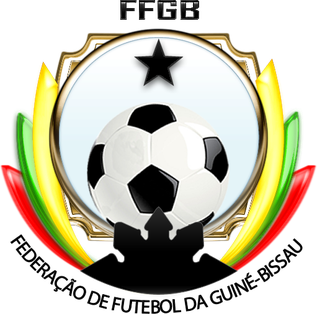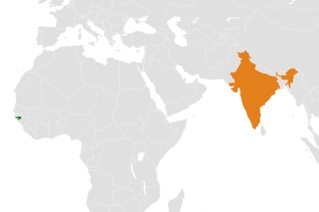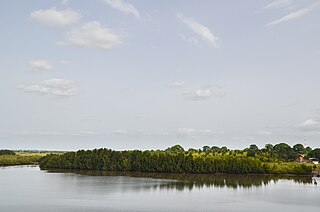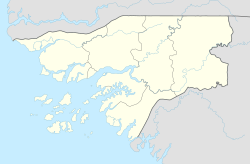Guinea-Bissau was dominated by Portugal from the 1450s to the 1970s; since independence, the country has been primarily controlled by a single-party system.

Bissau is the capital city of the African Republic of Guinea-Bissau. In 2015, Bissau had a population of 492,004. Bissau is located on the Geba River estuary, off the Atlantic Ocean, and is Guinea-Bissau's largest city, major port, and its administrative and military centre.

The Republic of Guinea-Bissau follows a nonaligned foreign policy and seeks friendly and cooperative relations with a wide variety of states and organizations. France, Portugal, Angola, Brazil, Egypt, Nigeria, Libya, Cuba, the Palestine Liberation Organization, and Russia have diplomatic offices in Bissau.

The Guinea-Bissau national football team is the national team of Guinea-Bissau and is controlled by the Football Federation of Guinea-Bissau. They are a member of the Confederation of African Football (CAF).
Dungal may also refer to:

The unicameral National People's Assembly is Guinea-Bissau's legislative body.
ISO 3166-2:GW is the entry for Guinea-Bissau in ISO 3166-2, part of the ISO 3166 standard published by the International Organization for Standardization (ISO), which defines codes for the names of the principal subdivisions of all countries coded in ISO 3166-1.

Guinea-Bissau–United States relations are bilateral relations between Guinea-Bissau and the United States.

The following outline is provided as an overview of and topical guide to Guinea-Bissau:

There are diverse religions in Guinea-Bissau with no one religion having a majority. The CIA World Factbook states there are about 45% Muslims, 22% Christians, 15% Animists and 18% unspecified or other while the US State Department mentions that estimates vary greatly and cites the Pew Forum data (2010) of 40% Muslim, 31% indigenous religious practices, and 20% Christian. Sunni Islam, including that of Sufi-oriented, are most concentrated in the northern and northeastern parts of the country. Practitioners of traditional indigenous religious beliefs generally live in all but the northern parts of the country. Christians are mostly found along the coastal regions, and belong to the Roman Catholic Church and various Protestant denominations. Christians are concentrated in Bissau and other large towns.

Republic of Guinea-Bissau passports are issued to citizens of Guinea-Bissau to travel outside the country. Guinea-Bissau citizens can travel to member states of the Economic Community of West African States (ECOWAS) without a passport.
The sport of football in the country of Guinea-Bissau is run by the Football Federation of Guinea-Bissau. The association administers the national football team, as well as the national league. Association football (soccer) is the most popular sport in the country. Since the Portuguese navigator Nuno Tristão reached the local coast in 1446, but at the latest since the official foundation of the colony Bissau in 1753, the country was a Portuguese colony, and became officially independent only in 1975. To this day, football in Guinea-Bissau is therefore characterized by its Portuguese origins and relationships, for example through a number of affiliates of the Portuguese clubs Sporting Lisbon and Benfica Lisbon. Also, many Guinea-Bissau footballers play in Portugal.
Guinea-Bissau Sign Language is an incipient sign language evolving from the single school for the deaf in Guinea-Bissau, which was founded in Bissau in 2003. In 2005 a linguist and Portuguese Sign Language teacher found GBSL to still be basic, but with some consistency among students in the school and village use when the students went home.

Guinea-Bissau made its Paralympic Games début at the 2012 Summer Paralympics in London, sending two T46 classified athletes to compete in track events.

Guinea-Bissau–India relations refers to the international relations that exist between Guinea-Bissau and India. The Embassy of India in Dakar, Senegal is concurrently accredited to Guinea-Bissau. India opened an Honorary Consulate in Bissau on 28 May 2010. Guinea-Bissau has no diplomatic mission in India.
The Military ranks of Guinea-Bissau are the military insignia used by the Military of Guinea-Bissau. Being a former colony of Portugal, Guinea-Bissau shares a rank structure similar to that of Portugal.









